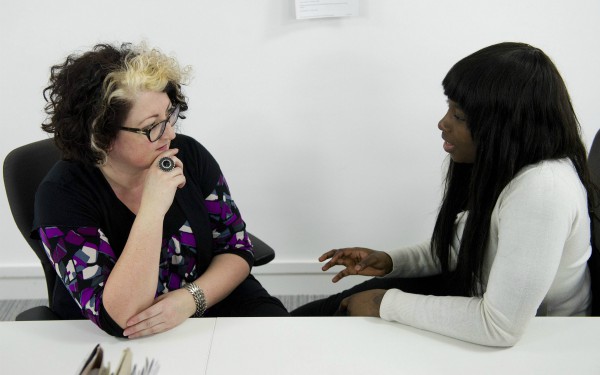

This article comprises of tips taken from a guide on Community Care Inform Children about burnout, secondary trauma and compassion fatigue, written by social worker Lori Goosen. Inform Children subscribers can read the full guide.
What is compassion fatigue?
In the opening pages of her book ‘Trauma Stewardship – An Everyday Guide to Caring for Self While Caring for Others’, Laura van Dernoot Lipsky describes a hike with her family. As they came to the top of a cliff, her first thought was to admire the spectacular beauty of the view. Her second thought, which she voiced to her stunned partner and children was: how many people have jumped to their death from this very spot? From this experience van Dernoot Lipsky began to examine the impact her daily exposure to the trauma of others had on her view of the world.
Perhaps the example she gives seems extreme, but consider the child protection social worker who, on seeing pictures of a friend’s baby celebrating his first birthday with a chocolate cake-covered face, first thinks “how sweet”, quickly followed by thoughts of baby Peter Connelly’s chocolate-covered face. Or the domestic violence worker who, when writing in a wedding card for her friend, considers slipping in a “where to get help if you are being hurt” card. Or the therapist who treats survivors of sexual abuse who won’t let her children stay overnight with friends or for school trips.
Working with abuse and trauma can have a profound impact on the worker as a person as a professional, as well as affecting the organisation and service users. Recognising and managing compassion fatigue is therefore key.
Professional reflection
Many social workers are passionate about the work they do and are dedicated to the children and families with whom they interact. It is vital that social workers do not lose sight of the positive aspects of their work, particularly as they are facing increased stress, trauma, and bureaucracy.
In addition to how an individual takes care of themselves outside of work, the way they think about their work can reduce the impact of compassion fatigue. The Huntington Institute (an organisation supporting humanitarian and disaster relief workers) refers to this as “working protectively”.
As part of working protectively, in professional reflection, social workers should consider the following:
- Why do you do this work? Has the reason changed from when you started? Have you lost your motivation for the work? Can you become re-inspired in your current role or is it time for you to move on?
- What aspects of your work give you the most pleasure, satisfaction, or sense of achievement? Are there ways for you to increase those areas?
- Do you know what you are doing in your work and why? (Do you see “the big picture” and your role in it for families, the organisation, and the larger community or do you feel you are working in isolation?)
- How do you measure success at work? Do you need to reconsider how you measure it? For example, in a homeless shelter one might consider having achieved success when a service user is adequately housed and financially stable. Whilst this might be the ultimate vision of success, is it a realistic one? One might reframe success to celebrate smaller achievements such as the client staying in the shelter for a week, having healthy meals and medical care as opposed to sleeping on the street. Reframing success into bite-sized chunks is more realistic for the worker and the service users and provides more opportunity for success.
- What aspects of your work can you control? (for example, timetables, varied work, etc). Do you have the opportunity to be creative and try new ideas? Determine what things are within your power to change and change them. Rethink how you can manage those things that cannot be changed.
- What are the personal costs (physical or mental health, relationships, etc) and rewards of doing this work? (How can you increase the rewards? Are the personal costs too great?)
Despite the challenges of social work, practitioners often say their career is extremely rewarding. Although social workers bear witness to pain and trauma, they also bear witness to resilience and healing and the potential for changed lives. Looking back over their careers, many social workers will be able to recall “success stories” where they feel they truly made a difference, where a child or family was given a new opportunity, where they experienced not the human capacity to hurt others, but the human capacity for love, kindness, happiness and growth.
It is those experiences that workers must keep in the forefront of their minds to help them remain passionate and protected in their work.


 Bournemouth, Christchurch and Poole
Bournemouth, Christchurch and Poole  Hampshire County Council
Hampshire County Council  Lincolnshire County Council
Lincolnshire County Council  Norfolk County Council
Norfolk County Council  Northamptonshire Children’s Trust
Northamptonshire Children’s Trust  South Gloucestershire Council
South Gloucestershire Council  Wiltshire Council
Wiltshire Council  Wokingham Borough Council
Wokingham Borough Council  Children and young people with SEND are ‘valued and prioritised’ in Wiltshire, find inspectors
Children and young people with SEND are ‘valued and prioritised’ in Wiltshire, find inspectors  How specialist refugee teams benefit young people and social workers
How specialist refugee teams benefit young people and social workers  Podcast: returning to social work after becoming a first-time parent
Podcast: returning to social work after becoming a first-time parent  Podcast: would you work for an inadequate-rated service?
Podcast: would you work for an inadequate-rated service?  Family help: one local authority’s experience of the model
Family help: one local authority’s experience of the model  Workforce Insights – showcasing a selection of the sector’s top recruiters
Workforce Insights – showcasing a selection of the sector’s top recruiters 

 Facebook
Facebook X
X LinkedIn
LinkedIn Instagram
Instagram
Comments are closed.